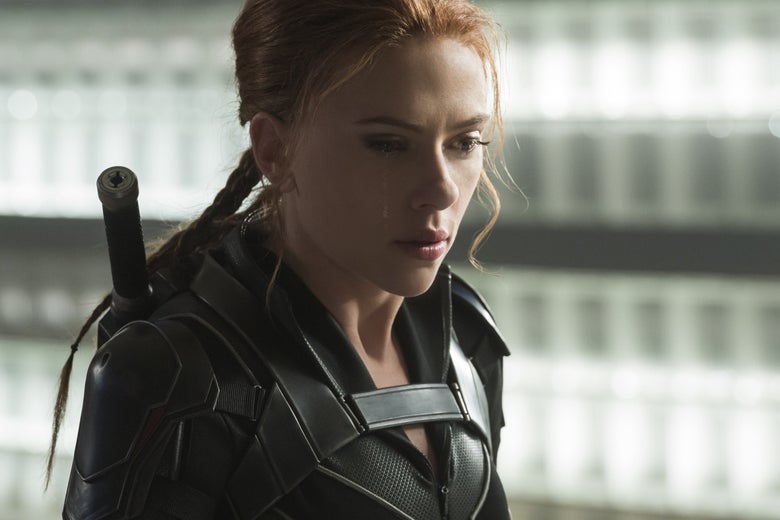
This article contains spoilers for Black Widow.
If you lay out all of the Marvel movies in a chronological line according to the events depicted therein, the latest entry into the Marvel Cinematic Universe, Black Widow, actually falls somewhere in the middle, in the interbellum period between Captain America: Civil War and Avengers: Infinity War. While it’s not impossible to make a compelling prequel or midquel (see, for example, the recent Planet of the Apes trilogy, or Alien: Covenant), it’s also a notoriously difficult feat to pull off. That Black Widow has to contend with this problem is a reminder of why it’s coming so late to begin with: For whatever reason, Marvel has been resistant to the idea of a female-led superhero movie until very recently—2019’s Captain Marvel was the first, despite being the 21st installment of the franchise, and Black Widow is now the second. The delay also means that Black Widow is also coming out after its main character’s death, bringing up yet another problem: Where’s the suspense in the story if you already know how it ends? It’s this question that plagues the film. While fun, Black Widow can’t credit what thrills it has to its title character. It’s less the superhero’s long-awaited breakout film than the ghost of the standalone that should have been.
[Read: Black Widow Is a Thrilling Remedy for the Sexism of Marvel Movies Past.]
There are three big threads at work in the movie. The first is establishing that Natasha isn’t alone in this world, because she has her adoptive family. The second is revealing a little more of Natasha’s backstory and forcing her to reckon with the nature of the mysterious Red Room. The third is setting up Yelena to take up Natasha’s mantle in the Marvel movies going forward. Unfortunately, all three threads are fraying, and for reasons that are all knotted up together.
That Black Widow has to set up Yelena as a player in future MCU movies and shows already means that Natasha is ceding some of the spotlight that she waited 24 movies to stand under, and the nuclear bomb of charisma that Florence Pugh sets off every time she’s on screen makes it feel like Natasha is already being forced off the stage. Not only does Yelena make fun of Black Widow’s superhero poses and hair flips, but she has a more compelling character arc, as she finally confronts the fact that her childhood, which she recalls as the best years of her life, was essentially a work of fiction, and starts claiming ownership over her life. (A scene in which she explains why a vest—the very first piece of clothing she’s purchased for herself—is important to her is a movie highlight, and Natasha is left to inherit it second-hand.)
By contrast, Natasha’s arc in the film is fairly listless. The idea that Natasha needs to find a family or doesn’t have any friends feels disingenuous after we’ve watched several billion dollars’ worth of Avengers movies that assembled her superpowered teammates as both. We’ve seen her literally give her life for her fellow heroes—her self-sacrifice for the Soul Stone in Avengers: Endgame is premised on the need for an Avenger to sacrifice someone they love—and her reluctance to accept her second found family (Aleksei, Melina, and Yelena) is resolved without much ado. As for the resolution of her past, it feels manufactured. By all appearances in the other movies, she’s moved on and made peace with her Widow past, and the movie begins with Natasha assuming that her tormenter, Dreykov, had been dead for years already, with the Red Room gone and done with. In other words, the movie spends two hours contriving the resurrection of Dreykov and the Red Room only for Natasha to kill them off once again and end up more or less where she started, which feels more than a little anticlimactic. The events of the film don’t register as something earth-shaking so much as a blip on Natasha’s radar. (Not to mention on everyone else’s: Apparently the events of the movie never merited so much as a flyby from another Avenger or a mention in another entry.)
The only part of the Dreykov storyline that registers at all is the fact that Natasha was once willing to kill a child as collateral damage, but the movie’s ultimate resolution to this storyline is similarly unsatisfactory. What the movie’s answer presupposes is: Maybe she didn’t? And also she’s very sorry—just ignore the rest of that red ledger!
[Read: The Casual Marvel Fan’s Guide to Black Widow]
But that’s a quibble that’s larger than just Black Widow, which has more pressing problems. Even the film’s mid-credits stinger underlines just how much this is Yelena’s story, not Natasha’s, as Natasha only appears in it as a name on a gravestone. The scene’s purpose isn’t to further the Black Widow mythology but to set up future adventures for Yelena, a character who benefits from not being dead. Black Widow just doesn’t quite feel like a Black Widow movie, which is a shame considering that this is apparently the last chance she’ll get. It’s more like a Black Widow afterthought and a Yelena prequel, too little too late to make up for the fact that Natasha never got her own movie while she was still alive.
"movie" - Google News
July 09, 2021 at 04:40PM
https://ift.tt/3yGHHoo
The Black Widow movie is too late to be standalone she deserved. - Slate
"movie" - Google News
https://ift.tt/35pMQUg
https://ift.tt/3fb7bBl
Bagikan Berita Ini














0 Response to "The Black Widow movie is too late to be standalone she deserved. - Slate"
Post a Comment